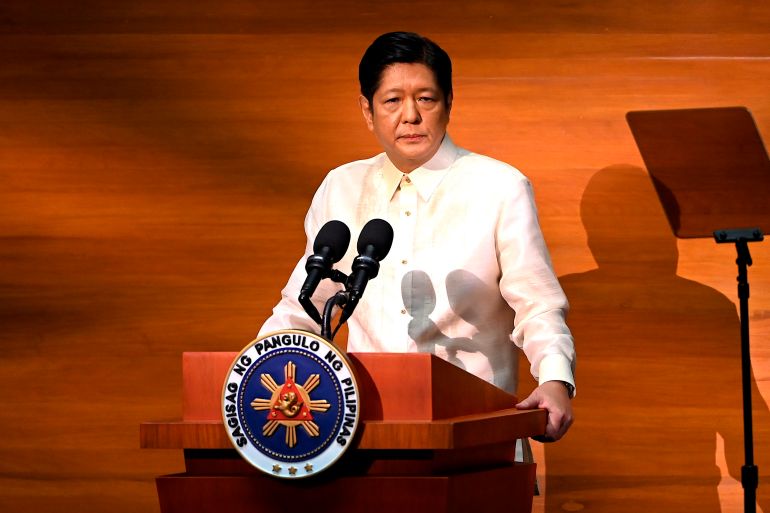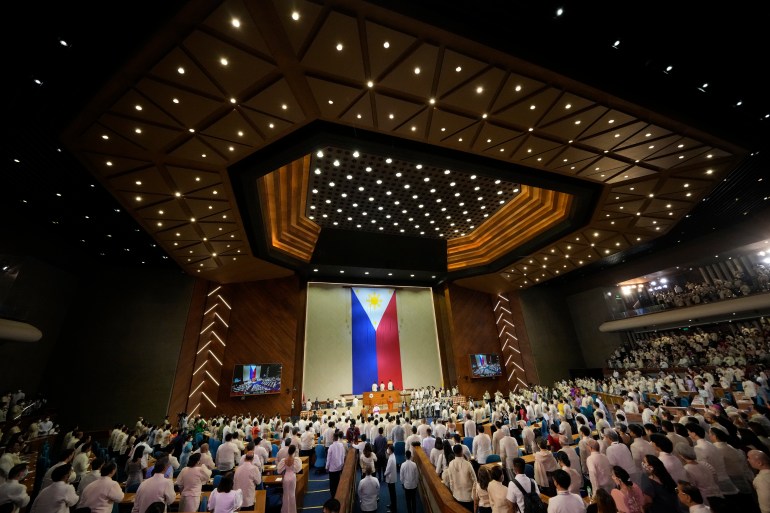Philippines’ Marcos Jr sets out big plans but little detail
Analysts say president’s first state of the nation address lacks detail and has notable omissions.

Philippine President Ferdinand Marcos Jr outlined a series of ambitious initiatives in his first State of the Nation Address (SONA), but analysts said the plans lacked detail and that there were glaring omissions on key issues such as human rights.
Hundreds of legislators, officials and guests gathered on Monday at the Batasan Pambansa Complex, the headquarters of the House of Representatives of the Philippines, in Quezon city to hear Marcos Jr set out his agenda in what is also the traditional curtain-raiser for sessions of the Senate and Congress.
Keep reading
list of 3 itemsHow a ‘tsunami of disinformation’ helped Marcos Jr win back power
In Philippines, fears for labour rights as Marcos takes power
Marcos Jr, who was inaugurated in July after winning a landslide election victory, started his speech by speaking about the economy – an urgent concern amid rapidly rising inflation rates and fuel prices.
Marcos Jr said the Philippines’ gross domestic product (GDP) would grow by as much as 8 percent annually over his six-year term in office. He pledged that the poverty rate would fall to single digits by 2028, and that a revamped tax system would bring in greater revenues by next year.
He also said he would expand the infrastructure programme of his predecessor Rodrigo Duterte, including by upgrading the Philippines’ rail network.
“We live in difficult times brought about by some forces of our own making, but certainly, also by forces that are beyond our control. But we have, and we will continue, to find solutions,” Marcos said in the speech.
But economics columnist and professor, JC Punongbayan, told Al Jazeera the speech was “light on the details”.
“These are targets, not plans. We can better evaluate his promises down the line,” Punongbayan said. “Marcos also mentioned raising more taxes from the digital economy. How much revenue do we expect from this?”
Rising prices
Weeks before the SONA, a Pulse Asia Research survey revealed that inflation topped the list of Filipinos’ most pressing concerns. Wage hikes, poverty reduction and curbing government corruption followed.
In June, the Philippines recorded 6.1 percent inflation, the second highest in Southeast Asia. It also reported the highest unemployment rate in the region at 6 percent, according to the Philippine Statistics Authority.

Although Marcos Jr made optimistic growth forecasts, think-tank IBON Foundation says the Philippines was actually the fifth-worst performing economy among the 10 countries in the Association of Southeast Asian Nations (ASEAN) during the coronavirus pandemic.
Sonny Africa, IBON’s executive director, told Al Jazeera that Marcos Jr’s speech lacked real solutions to the country’s economic problems and was borrowing from his predecessor’s playbook in terms of economic priorities.
“The speech confirms that the president does not have any original thinking about the economy nor a comprehensive plan to correct its long-term decline,” Africa said.
“Why are there specific numbers for huge infrastructure spending but not when it comes to social services when we need it most?” he asked.
Others said they hoped to hear about plans for desperately needed financial assistance for vulnerable workers such as drivers of jeepneys – minibus-like public vehicles.
“We are dismayed. Instead of a remedy for soaring oil prices, Marcos Jr wants more taxes, on top of the ones on fuel,” Elmer Cordero, 74, a local leader at the Monumento-Baclaran jeepney terminal, told Al Jazeera.
“We need to keep fuel costs down if we are ever to go back on the road. Marcos Jr’s SONA sounded more like a business proposal rather than an intention to help those in need.”
Transport group Piston estimates about 20 percent of the country’s jeepneys have prematurely retired from the roads since the start of the year because incessant oil price hikes make a day’s shift too expensive.
Analysts said Marcos Jr’s speech, which ran for an hour and 14 minutes, also failed to mention or expound upon a host of other key issues.
Professor Bobby Tuazon, a public policy expert at the Center for People Empowerment in Governance (CenPEG), said measures to tackle corruption and human rights were noticeably absent from the president’s debut SONA.
Thousands of demonstrators marched ahead of his speech calling for justice for victims of human rights abuses under the two-decade rule of Marcos Jr’s late father, a dictator who was deposed in a 1986 uprising.
Meanwhile, although Marcos Jr pledged he would not make any concessions to China on disputed maritime territories, Tuazon said that he would struggle to stick to that stance – especially as Duterte had also made a similar claim in the past, only to take a softer line amid numerous incursions by Chinese vessels in the regions.
“It is more of a political message to secure the cooperation of Congress and other major interest groups in support of Marcos Jr’s foreign policy,” Tuazon said. “Like Duterte, he can use it as leverage on China.”